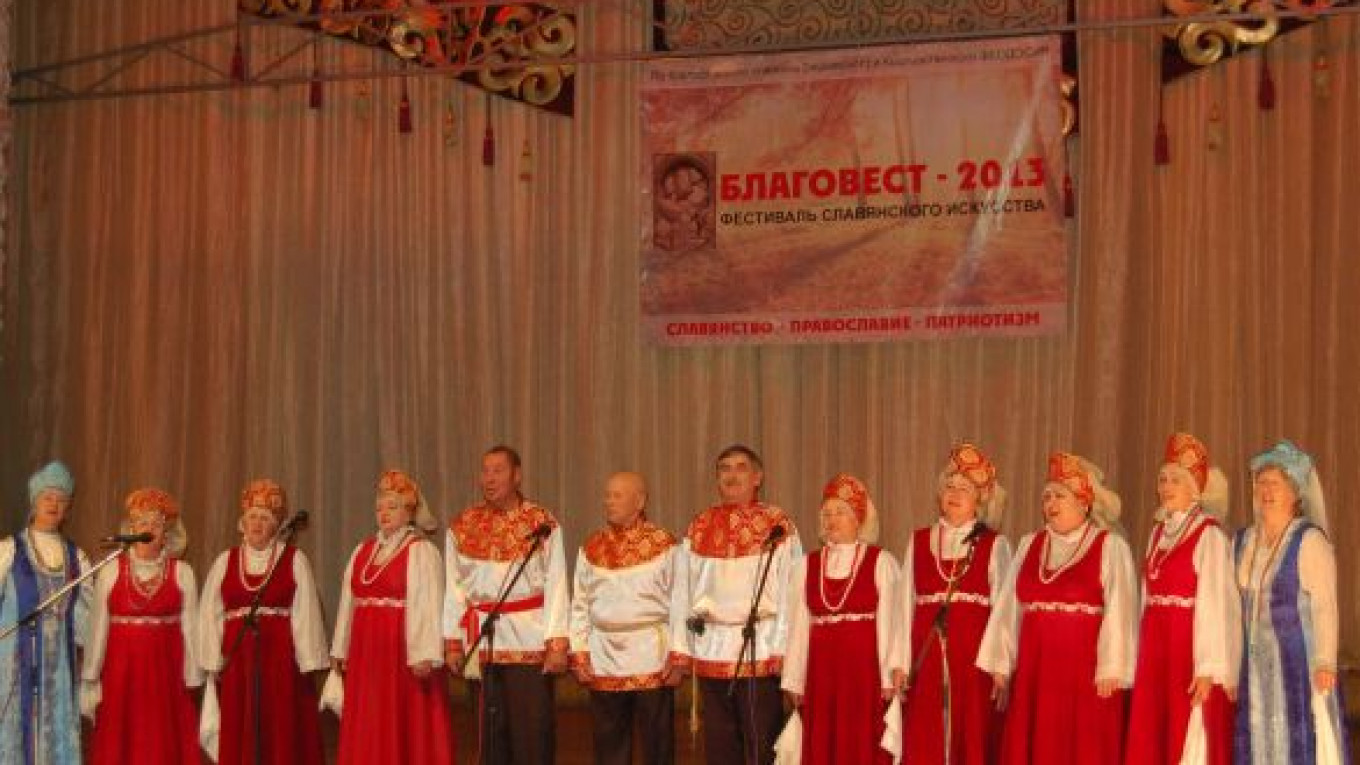Beneath the blue-painted steeples of Bishkek's Russian Orthodox Church, the wooden rafters echo with the sound of traditional Slavic folk songs. The audience, mostly babushkas wrapped in hats and coats of fur, are enraptured; their eyes, normally so stern, dance with delight.
Kyrgyzstan may not spring to mind as an important hub of Slavic culture, but in recent years Slavic culture has flourished in this post-Soviet country. Events like the concert in Bishkek, part of the three-week long "Blagovest" festival celebrating Slavic culture, now occur regularly across the country, from the capital, Bishkek, to cities such as Karakol, home to the first ethnic Russians settlers in Kyrgyzstan, who arrived in the late 1860s.
"Kyrgyzstan has relatively favorable conditions for maintaining a rich presence of Slavic and Russian culture," said Alexei Zenko, head of the Mission of Rossotrudnichestvo and director of the Russian Center for Science and Culture in the Kyrgyz Republic. "In society and in politics there are good relations with the Russian population."
There are nearly half a million ethnic Russians living in Kyrgyzstan, accounting for percent of the country's population. Russian, as one of the official languages, is spoken by the majority of the population on a day-to-day basis, and Slavic culture has an elevated status in the country. The education system devotes significant attention to teaching Slavic and other traditional Russian literature, history and songs.
Though 80 percent of the population is Muslim, many Slavic holidays remain national holidays in Kyrgyzstan, celebrated in the traditional manner by ethnic Russians and Kyrgyz alike. Most notable are the Easter and Christmas ceremonies, but smaller traditional holidays are also observed. Some of the ceremonies have even adopted customs influenced by local Kyrgyz traditions, showing that the relationship between Slavic and Kyrgyz culture works both ways.
Historically, the cultural tie to Russia is unquestionable. First incorporated into the Russian Empire in 1876, Soviet power was later established in 1919 and would remain more than 70 years. It was during the Soviet period that Kyrgyz oral literature was first written down, and Russian language was the medium through which Kyrgyz culture was canonized and became known by the wider world. The first Kyrgyz opera was written in Russian, and many Kyrgyz writers began their careers writing in Russian and became famous only after being recognized by Moscow.
Today this cultural tie remains largely intact. Currently in its ninth year, the pan-Central Asian "Blagovest" festival is just one of the many events on the Russian culture calendar. The festival attracts Slavic choirs and musicians from across Central Asia, with performers this year coming from Kazakhstan and Uzbekistan to participate.
Highlights of this year's festival included songs entitled "We are United by Russia, God and Love," and "Everything Is Thanks to God," along with the ever-popular "Down the Volga River," performed by the choir Zori Semirechiya.
Yury Anstasian, organizer of Blagovest, is delighted by the high profile that Slavic culture enjoys in Kyrgyzstan. "In some of the other post-Soviet countries, it is difficult to even find choirs who will sing traditional Slavic songs, but here in Kyrgyzstan we have at least 10 professional choirs and even more amateur choirs."
The audience appeared to be delighted by the popular Slavic folks songs, many of which are no longer heard as often as they once would have been. "I come to the Blagovest festival every year, and I have been to every single concert this time," said Elisaveta Kisayeva, aged 68, from Bishkek. "It is wonderful, just wonderful! Many of the songs remind me of my childhood."
Other elements of Russian culture besides folk songs continue to flourish in Kyrgyzstan. "The country has a rich history of all aspects of Slavic culture, particularly in the field of literature," said Nina Kharchenko, a professor of Slavic Studies at the Kyrgyz-Russian Slavic University, which was founded in 1992 to maintain academic and cultural cooperation between Russia and newly independent Kyrgyzstan. "Kyrgyzstan's libraries contain many rare, original Slavic manuscripts and books, which are of enormous historical, cultural and scientific importance. The most prized book is probably the first edition copy of "The Apostle," by Ivan Fedorov, published in Moscow in 1564."
For Yury Anstasian, an ethnic Russian born in Kyrgyzstan, keeping Slavic culture alive and flourishing in Kyrgyzstan is very important. "At the end of the day," he said, "cultural roots are very important, for everyone." And the folk songs in particular, he said, are "food for the soul."
Contact the author at artsreporter@imedia.ru
A Message from The Moscow Times:
Dear readers,
We are facing unprecedented challenges. Russia's Prosecutor General's Office has designated The Moscow Times as an "undesirable" organization, criminalizing our work and putting our staff at risk of prosecution. This follows our earlier unjust labeling as a "foreign agent."
These actions are direct attempts to silence independent journalism in Russia. The authorities claim our work "discredits the decisions of the Russian leadership." We see things differently: we strive to provide accurate, unbiased reporting on Russia.
We, the journalists of The Moscow Times, refuse to be silenced. But to continue our work, we need your help.
Your support, no matter how small, makes a world of difference. If you can, please support us monthly starting from just $2. It's quick to set up, and every contribution makes a significant impact.
By supporting The Moscow Times, you're defending open, independent journalism in the face of repression. Thank you for standing with us.
Remind me later.






